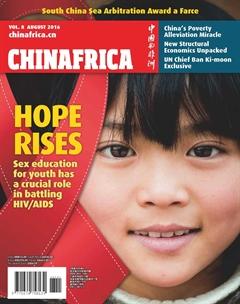Home Away From Home
By Belal Mohamed Babiker
in beijing, people constantly tell me that they are mystified when they meet me for the first time, especially the Chinese. I look Indian but I speak fluent Chinese and I am actually from Sudan.
I am here because I love languages and I wanted to learn Chinese. But I am also here because Arabic, the language I speak back at home in Khartoum, is becoming an increasingly important language for China.
When I was a mass communications student at the University of Khartoum, I wanted to learn a new language. While exploring which one would be the best for me, I discovered that due to a cooperation between China and Sudan, every year 25 Sudanese students were chosen to go to China and study Chinese there.
So I applied with alacrity but it was not easy. I was not among the chosen few and they told me they had put me on the waiting list. I was patient and waited. I still had the desire to go to China and learn Chinese. Finally, after I had graduated, I was told I had been selected for a two-year course to learn Chinese at the Beijing Language and Culture University and of course I said yes immediately. It was mid-2009 when I first arrived in Beijing as a wonderstruck 22-year-old.
From there, fast forward to 2012 and you have a new Belal Mohamed Babiker - yes, thats me - speaking Chinese at the drop of a hat, mingling with people freely and accomplishing feats that are daunting to foreigners in China, like opening bank accounts, with perfect ease, thanks to two years of slogging to master Chinese. My newly acquired Chinese also helped me land a job in China with ease.
I work in the Arabic language division of China Radio International (CRI), a multi-language broadcaster based in Beijing. We have a five-member team, with a peer from Sudan and the rest from Egypt, Mauritania and Algeria. There is growing cooperation between CRI and African radio stations like those in Sudan and Mauritania. Besides regular Arabic programs that can be heard in Africa on FM, CRI also does podcasts and social media posts in Arabic.
With Chinas economic and diplomatic ties with the Arabic-speaking Middle East and North Africa growing, Arabic is becoming an important resource for China. Chinese students are realizing that it is easier to get jobs if they know Arabic. Many big Chinese electronic companies have factories in Shenzhen in south Chinas Guangdong Province, and from there they do business with the Middle East countries. On the other hand, you have Africans, Arabs and Arab-Africans doing business in commercial centers in China like Guangzhou and Yiwu cities. Knowing Arabic will facilitate all this.
The Arabic presence in China facilitated my own arrival and stay here. When I first arrived in Beijing, it was the first day of Ramadan, the holy month for Muslims when they fast during the day as a purification ritual. However, since I was traveling, taking a 12-hour flight from Khartoum to Beijing via Dubai, I was exempted from fasting. We have relatives in Beijing who met me at the airport and took me to their home. So I had to face none of the problems first-time travelers without any knowledge of Chinese are likely to face upon arrival.
Afterward, when I joined the university, to my indescribable joy I found a community of Sudanese students there, including a couple of my own classmates from Khartoum. So we banded up and began to cook together, which took care of the food problems Muslims could face in China due to the preponderance of pork, which Muslims do not eat. And then, when it was time to offer our prayers, they took me with them to the Sudanese Embassy, which had made arrangements for the Sudanese in Beijing to meet and offer their prayers there. I was overwhelmed.
Now that I have been in Beijing for nearly seven years, I am a veteran and every Ramadan, I get together with my friends to observe it just the way we would do at home. This Ramadan, which started from June 6 and ended on July 5, I had the best of both worlds. I spent part of it in Beijing and then went home on June 30, just before the big finale, to celebrate with my family in Khartoum.

